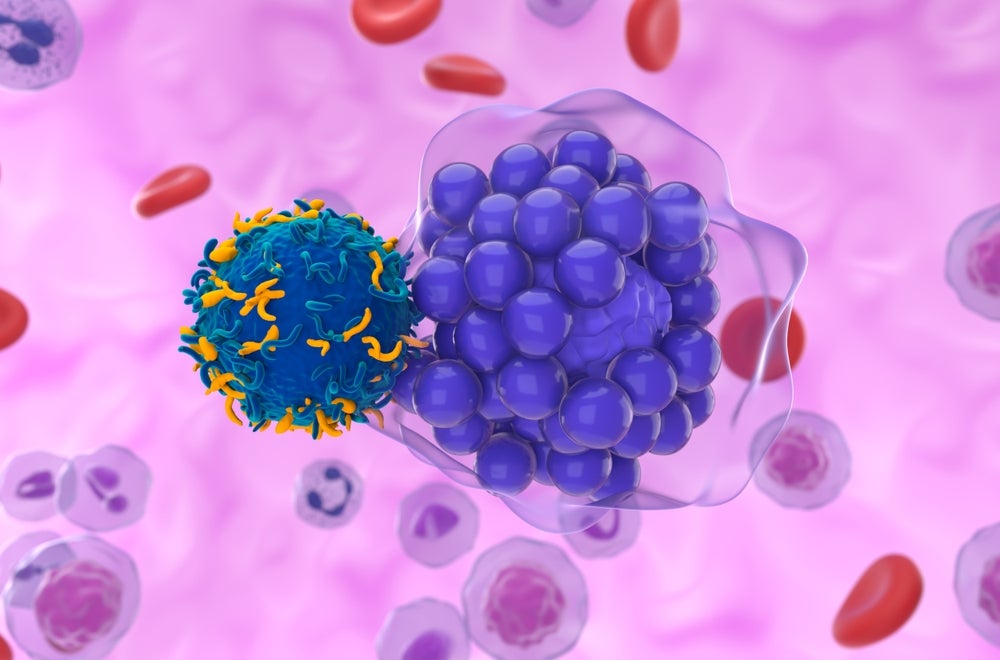Immune Complexes Enhance Stem Cell Protection Against Cancer
A groundbreaking preclinical study conducted by researchers at Weill Cornell Medicine has unveiled the pivotal role of a group of immune proteins known as the inflammasome in cancer prevention. The inflammasome, a crucial component of the innate immune system, is traditionally recognized for its function in responding to infections. However, this new research suggests that […]


A groundbreaking preclinical study conducted by researchers at Weill Cornell Medicine has unveiled the pivotal role of a group of immune proteins known as the inflammasome in cancer prevention. The inflammasome, a crucial component of the innate immune system, is traditionally recognized for its function in responding to infections. However, this new research suggests that it also holds significant responsibility in maintaining the health of blood stem cells by managing specific receptors on their surfaces and inhibiting cancer-promoting gene activity. Published in the esteemed journal, Nature Immunology, the findings hold promise for the development of therapeutic strategies targeting the early stages of cancer, potentially revolutionizing how we address this formidable disease.
The study, spearheaded by Dr. Julie Magarian Blander, a prominent figure in immunology at Weill Cornell Medicine, elucidates the duality of the inflammasome’s role in cancer dynamics. On one hand, it contributes to inflammation associated with adverse outcomes in advanced cancer stages. On the other hand, during the nascent stages of tumor development, the inflammasome serves as a guardian, preventing the transformation of healthy stem cells into malignant cells. This dual functionality poses intriguing questions about the intricate balance between inflammation and cancer suppression within the immune landscape.
Dr. Blander and her team employed a mouse model of B-cell lymphoma, specifically the Eµ-myc model characterized by a mutation in the Myc oncogene. These mice exhibit a protracted latency before tumors form, providing researchers with a valuable window to investigate the early events in cancer initiation. The focus was on the hematopoietic stem cells, the precursors of B-cells, allowing the team to discern how the inflammasome influences the early cellular environment where cancer may begin.
A staggering discovery emerged when the team genetically modified the Eµ-myc mice to disrupt inflammasome activity. This alteration significantly expedited stem cell proliferation and tumor growth, underscoring the inflammasome’s critical protective role against cancer development. Surprisingly, control mice, which also lacked the inflammasome, revealed accelerated stem cell proliferation, indicating that the inflammasome is essential for maintaining healthy cellular dynamics. In this context, the elevation of Ras protein levels, a known oncogene product, emerged as a key player. The inflammasome’s ability to regulate Ras appears to be a vital mechanism by which it curbs the risk of malignant transformation.
Pivotal to the inflammasome’s role in cancer prevention is its interaction with the bone marrow stroma—a specialized microenvironment that shelters and nurtures stem cells. Investigators found elevated levels of soluble tumor necrosis factor (TNF) receptors in the stroma of control mice compared to their inflammasome-deficient counterparts. This observation revealed that the inflammasome facilitates the shedding of TNF receptors from stem cell surfaces, a process that prevents excessive stem cell proliferation. The retention of TNF receptors in the absence of inflammasome activity leads to an environment ripe for uncontrolled stem cell growth, further emphasizing the necessity of the inflammasome in regulating cellular homeostasis.
As research progresses, the team plans to explore the inflammasome’s protective effects beyond hematopoietic stem cells, examining its influence in various tissues. Additionally, they aim to pinpoint the specific stromal cell types engaged in this protective response and delineate the molecules utilized by the inflammasome to suppress cellular proliferation. Understanding the mechanistic underpinnings of the inflammasome’s function could unveil novel avenues for intervention in cancer prevention.
The implications of this research extend beyond academia. By identifying the inflammasome’s beneficial role in staving off cancerous transformations, researchers are laying the groundwork for targeted therapies. Dr. Blander envisions a future where therapeutics can selectively harness the inflammasome’s protective functions while mitigating its pro-inflammatory actions associated with late-stage cancer progression. Such an approach could redefine our strategy in cancer prevention and open new frontiers in treatment paradigms.
This study underscores the intricate relationship between the immune system and cancer biology, unraveling the layers of complexity that define tumor initiation and progression. It serves as a reminder that harnessing our understanding of immunological processes can pave the way for innovative solutions to some of health’s most pressing challenges. The dual functionality of the inflammasome exemplifies the delicate balance that exists within our bodies—a balance that, when disrupted, can lead to diseases as serious as cancer.
As the scientific community continues to delve into the multifaceted nature of the inflammasome, the potential for transformative therapies becomes increasingly tangible. This research not only highlights the importance of early interventions but also reiterates the significance of preventive measures in our fight against cancer. In a world where cancer remains a leading cause of mortality, such insights illuminate the path forward toward effective prevention and treatment strategies, providing hope for patients and families affected by this devastating illness.
The ongoing exploration of the inflammasome’s mechanisms presents an exciting opportunity for devising new therapeutic interventions. By refining our understanding of this immune complex, we can potentially create strategies that leverage its protective properties against malignancy while curbing its contribution to chronic inflammation. This holistic perspective on immune functionality will undoubtedly enrich the landscape of cancer research in the coming years, paving the way for breakthroughs that could change lives.
Understanding the inflammasome’s intricate interactions with various cellular components will be crucial in enhancing therapeutic efficacy. In this regard, collaboration between immunologists, oncologists, and geneticists will be imperative to comprehensively address the challenges posed by cancer. As we continue to unlock the mysteries of the immune system, we inch closer to realizing a future where the onset of cancer can be preempted, fundamentally altering the trajectory of this disease and improving patient outcomes.
In conclusion, this innovative research by Weill Cornell Medicine investigators offers fresh insights into the immune mechanisms that guard against cancer. By delineating the inflammasome’s dual role in cancer prevention and progression, this study not only contributes to our understanding of cancer biology but also lays the foundation for future therapeutic strategies aimed at safeguarding health and well-being. It emphasizes a pivotal shift in cancer research, focusing on prevention rather than just treatment, thereby igniting hope in the ongoing battle against cancer.
Subject of Research: Role of the inflammasome in preventing blood stem cells from becoming malignant.
Article Title: Inflammasome: A Protector Against Cancerous Transformations in Blood Stem Cells
News Publication Date: January 2, 2024
Web References: Nature Immunology
References: Details regarding references not provided.
Image Credits: Details regarding image credits not provided.
Keywords: Inflammation, Stem cell research, Hematopoietic stem cells, Stem cell therapy, Cancer stem cells, Gene targeting.
What's Your Reaction?

































